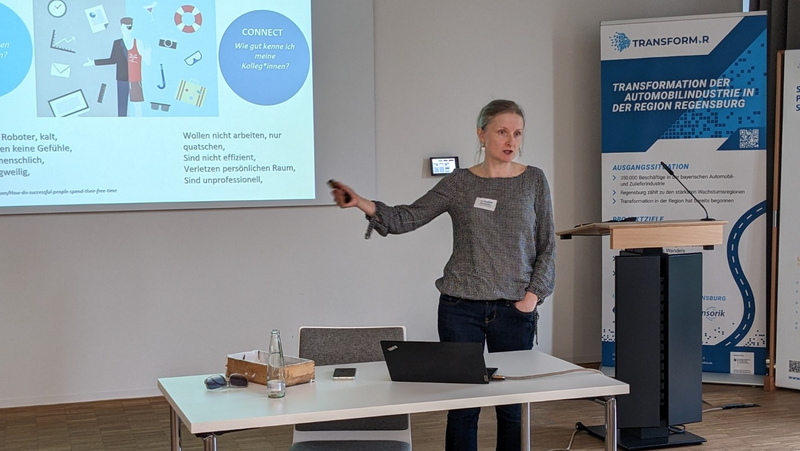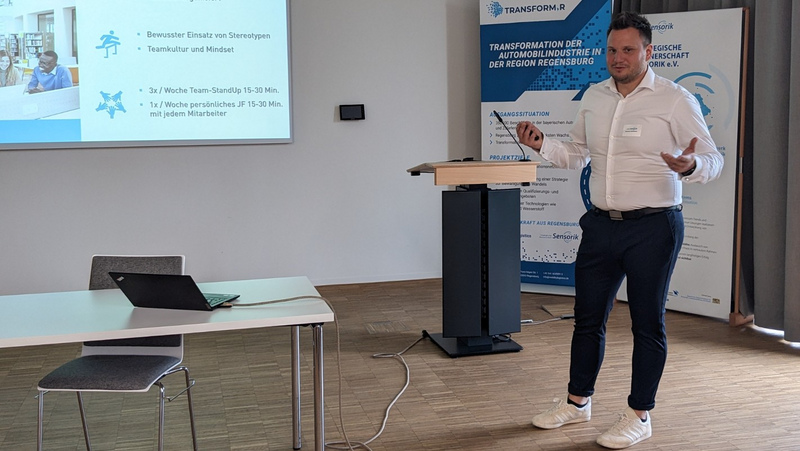It is no longer uncommon for teams to work across different countries. International specialists can also ensure the future viability of a company, especially in times of staff shortages. But what does everyday working life look like, what challenges does the interaction of diverse skills and nations entail? How can teams with a multinational background be managed successfully? Thomas Klimstein, project manager in the automotive supplier industry, and Eliza Skowron (Working Between Cultures) answered these questions at the Bavarian sensor network's transform-DiaLog on May 16.
In multinational teams, leadership patterns that have worked for years in a nationally homogeneous team often prove to be no longer suitable and sometimes even lead to misunderstandings. According to Eliza Skowron from Working Between Cultures, this is not due to language barriers; intuition can also often be completely misleading in an intercultural context, just as culture should not be understood on a national or religious level. Different values and norms that shape employees are often the cause of misunderstandings. "Culture is like software of the mind," says Skowron, adding: "...with constant updates." She has plenty of experience in dealing with new cultures: she herself is of Polish origin, studied German as a foreign language and has been working internationally in adult education for 20 years. The three criteria "Connect, Perform and Enjoy" according to Brinkmann and van Weerdenburg are also decisive for Skowron for the success of cooperation in an international context. The term "small talk", which often has a negative connotation, is important for good "connecting". However, this must be sustainable. This means not just talking about the weather, but also remembering content from conversations and picking it up again in other small conversations, which creates trust and loyalty.
As part of group work, the participants were then able to critically reflect on their leadership behavior and actions in the team. Thomas Klimstein was also able to apply the lessons learned from Skowron's presentation. The project manager in the automotive industry had a task ready that he himself had to solve as a coach: the collaboration of two teams from different countries, different age groups and experience levels as well as different managers. According to his many years of experience, cultural differences are almost never the cause of a problem. "At its core, it's always about communication and mutual appreciation, which is the basis for good collaboration," says Klimstein. "Clear expectations also create a motivating environment." Nevertheless, physical distance cannot be dismissed as a barrier in international teams, but there are also solutions for this in the virtual space. He advises managers to meet with the team three times a week in a short "stand-up meeting" and also to meet with each employee personally in a further meeting. In his environment, virtual "town halls" in a question-and-answer style instead of a frontal lecture by managers or the "Say hi to Elli" method, in which employees are given space to address critical, disruptive topics, the elephant in the room, have proven successful. This makes employees feel seen and noticed - an essential aspect of cooperation.
The transform-DiaLog practical meeting is part of the "transform.r" project funded by the BMWK. In the transform-DiaLogs, the sensor technology network addresses new strategies for securing skilled workers. These meetings for company practitioners highlight, among other things, new approaches to work process-integrated further training, motivation for lifelong learning and internationally visible employer branding strategies. Participants can learn from good practices from the region as well as experiences from nationwide experts and receive targeted support in developing their own solutions in interactive workshop units.
Registration and details on the transform-DiaLog on July 11 at: https://eveeno.com/transformr-future-skills
Participation is free of charge. The transform-DiaLog is aimed at specialists and managers from companies and institutions as well as stakeholders from the field of vocational training.




